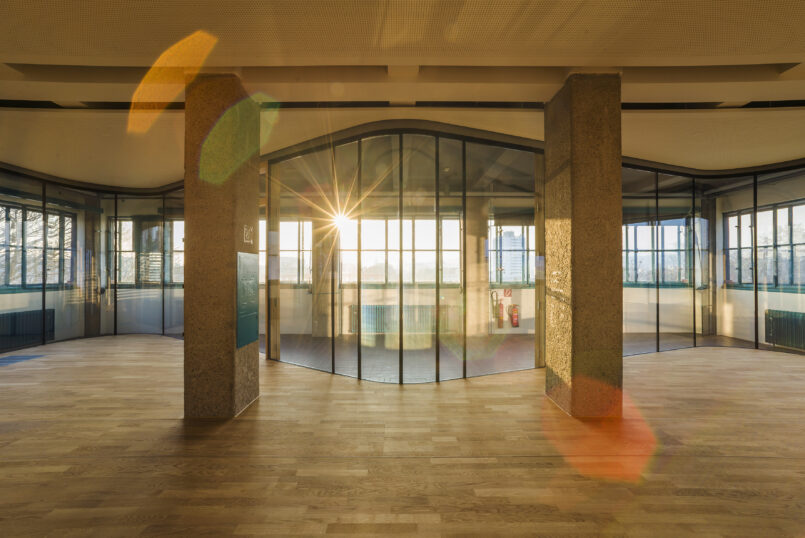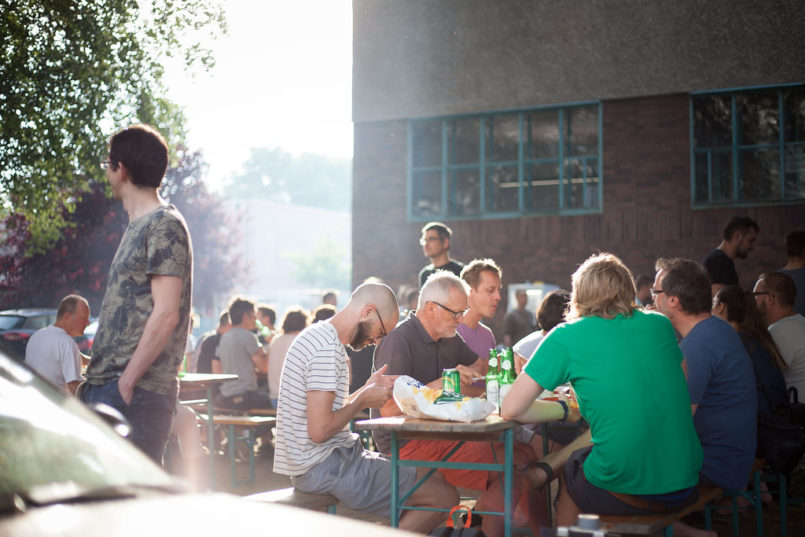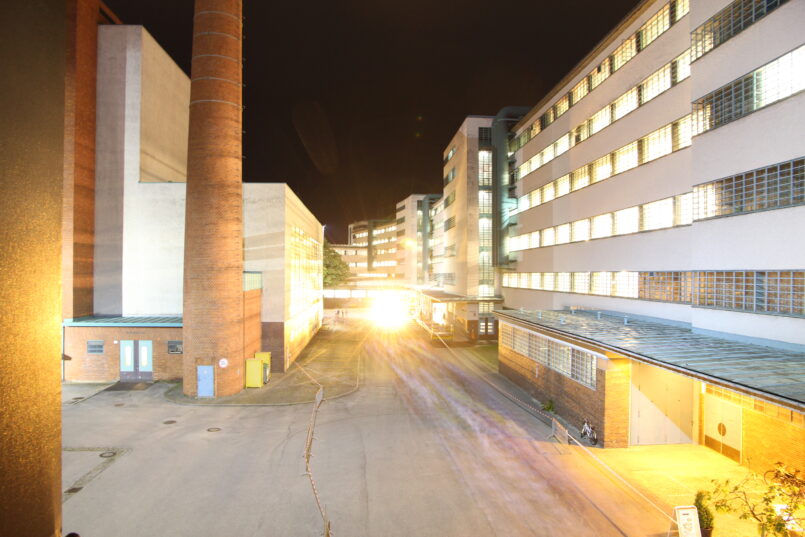In order to establish a relationship of trust between all the Tabakfabrik stakeholders, clear guidelines are needed. These guiding principles apply both to the tenants, the political representatives and the administration Tabakfabrik Linz Entwicklungs- und BetriebsgmbH (Translates roughly as “Linz Tobacco Factory Development and Operations, Ltd.”), and to the administration’s function as an interface with other levels of government such as the offices of LinzKultur or the City of Linz Business Service. During this first wave of the pioneering settlement phase now commencing, the guidelines are being discussed and formulated, allowing them to be integrated in actual current practice.
Tabakfabrik has set four key principles: participation, transparency, openness and sustainability.
Participation

© Thomsen Photography
By purchasing Tabakfabrik, the former Linz tobacco factory, the public sector has invested in the future. The cycle of financial speculation has been finally broken, and an entire city district made available to the public. The types of people explicitly called upon to colonize Tabakfabrik is not just limited to artists, art managers, and creatives – social workers, businesswomen, tradesmen, craftspeople, and people working in education and science are also moving in and developing new forms of human coexistence and collaboration: diversity condensed.
This place is both a physical space and a social sphere, a place of work, inspiration, of learning and of meeting, of possibilities and concrete utopias. The time has now come for us to invent this place together. We must actively shape Tabakfabrik like a social sculpture. The public sector is responsible for all the project development, financing, leasing, and site rehabilitation aspects of this.
In order to develop this location, we need people of different disciplines with a wide range of skills and experience to analyze and discuss aspects of urban development, architecture, organization structuring, art development, etc. from various perspectives. We also need a highly motivated team from a variety of different backgrounds that can shape, guide, and manage the site development process.
However, the development of the former tobacco factory into Tabakfabrik began long before the purchase of the site in 2009, with intensive discussions with a vast range of stakeholders. So any careful development process must also reflect previous deliberations and chains of thought, and the outcomes of any talks already held. In the case of Tabakfabrik, these have included the preliminary study conducted on behalf of the City of Linz in advance of the purchase, on the use of the site of the former Austria Tabak tobacco factory as an arts centre; the recommendation papers penned by the independent arts scene and the City arts advisory board; the arts development plan (both the previous one and the one currently being drafted) and the EuroPan competition. In these papers and plans, many ideas were formulated, demands articulated and city infrastructural challenges highlighted – all of which Tabakfabrik can help solve.
Transparency

© Martin Sieghart
To get people excited about Tabakfabrik, we need public information and transparent communications processes. Transparency inspires confidence; transparent procedures and decision-making structures dissolve preconceptions and disprove rumors. Transparency also encourages people to participate and to develop a sense of ownership, both of which are important factors in developing a location.
The classic PR comprises direct contact and cooperation with media that share values equivalent to the four cornerstones of Tabakfabrik, such as the public broadcasters Ö1 and FM4, the independent radio and TV stations, and private channels such as ServusTV. The website is the central information hub for all; the blog offers insights into daily life at Tabakfabrik, and the social media channels are both a place where anyone can hang out and a platform for direct interaction with the public. A body of information has been amassed about Tabakfabrik and will be made publicly available in a wiki. Making this knowledge available in writing enables the spread of learning and democratizes access to information.
Openness

© Tessi Lehner
Tabakfabrik believes in open spaces and personal freedom. Due to its interdisciplinary orientation and the interlocking nature of its four cornerstones, Tabakfabrik is developing an enormous capacity to be able to respond flexibly to new social developments. Tabakfabrik cannot ever become fully developed in the traditional sense, since some space always needs to be kept free for independent thought and experimentation, and since no one can predict how our world will be in 30 years’ time. For those same reasons, Behrens deliberately chose to incorporate large, open-plan spaces, which can be easily adapted, into his design of the original tobacco factory.
This concept now needs to be translated from that original industrial logic and enhanced to fit the new intended purposes. In doing so, there needs to be a particular focus on formulating the settlement policy in certain areas in such a way that financially less endowed initiatives can also be given a permanent place within the complex, in keeping with the idea of societal justice. This matches Tabakfabrik’s stated attitude of socio-political openness and inclusion.
Sustainability

To ensure that the potential uses of the site remain varied and of high quality in the long term, a solid financial foundation is required. The usage/rental structure should be designed as an economically balanced system that takes into account all the specific building-related and operational factors that can impact costs. The rental structure is subject to these conditions, staggered according to the different categories of premises and floor spaces, and is based on transparent criteria. However, the rental structure does also take into account the cultural and symbolic capital that users contribute to Tabakfabrik and that both Tabakfabrik and other tenants can benefit from.